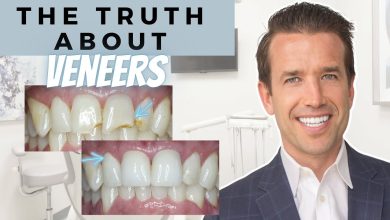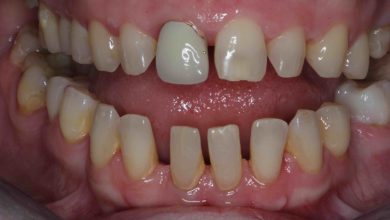What is Dental Veneers?

Dental veneers are thin, custom-made shells that are bonded to the front surface of teeth to improve their appearance. These shells are made from tooth-colored materials such as porcelain or resin and are designed to match the natural color and shape of your teeth.
Dental veneers can be used to fix various cosmetic issues, such as chipped or broken teeth, stained or discolored teeth, gaps between teeth, or crooked teeth. They provide a quick and effective solution for enhancing the overall aesthetics of your smile.
With the help of dental veneers, you can achieve a brighter, more balanced, and symmetrical smile, boosting your self-confidence and improving your overall dental health.
The Basics Of Dental Veneers
Dental veneers are thin custom-made shells that are bonded to the front surface of teeth to improve their appearance. They are typically made of porcelain or composite resin and are designed to match the natural color and shape of your teeth.
Dental veneers are a popular cosmetic dental treatment that can enhance the look of your smile. They are a great option if you have stained, chipped, or misaligned teeth. Veneers are also used to close gaps between teeth and to improve the shape and size of worn or uneven teeth.
What Are Dental Veneers?
Dental veneers are thin shells that are bonded to the front of your teeth. They are custom-made to fit your teeth and are designed to look like natural teeth. Veneers are a long-lasting solution that can significantly improve the appearance of your smile.
How Do Dental Veneers Work?
Dental veneers work by covering the front surface of your teeth, effectively hiding any imperfections. Before getting veneers, your dentist will remove a small amount of enamel from your teeth to ensure a proper fit. Then, they will take an impression of your teeth to create the custom veneers. Once the veneers are ready, your dentist will bond them to your teeth using a special adhesive.
What Dental Issues Can Veneers Address?
Veneers can address a variety of dental issues, including:
| Stained or discolored teeth | Chipped or broken teeth |
| Misaligned or crooked teeth | Gaps between teeth |
| Worn or uneven teeth | Small or short teeth |

Credit: rollinghillsdentistry.com
Types Of Dental Veneers
Dental veneers are a popular cosmetic dental treatment option that can enhance the appearance of your smile. They are custom-made, wafer-thin shells made of porcelain or composite resin that are bonded to the front surface of your teeth.
Types of dental veneers include porcelain veneers and composite resin veneers. Porcelain veneers are a natural-looking and durable option. They are designed to match the color, shape, and size of your existing teeth, providing a seamless and beautiful smile.
Composite resin veneers are a cost-effective and versatile choice. They are made up of a composite material that can be directly applied to your teeth. Composite resin veneers can be used to correct minor cosmetic issues, such as chipped or stained teeth, and can be easily repaired if damaged.
Whether you choose porcelain or composite resin veneers, it’s important to consult with a dentist to determine the best option for your individual needs. Dental veneers can give you a confident and radiant smile that you’ll be proud to show off.
The Veneer Placement Process
Dental veneers are thin shells made of porcelain or composite resin that are placed over the front surface of teeth to improve their appearance. The veneer placement process typically involves several steps.
Consultation and examination: Before getting dental veneers, you will have an initial consultation with a dentist. During this consultation, the dentist will examine your teeth and discuss your goals and expectations.
Tooth preparation and impression: In order to prepare your teeth for veneers, a small amount of enamel is usually removed from the front surface. This allows room for the veneers to be placed without making your teeth look bulky. Impressions of your teeth are then taken to create custom veneers that fit perfectly.
Temporary veneers: While waiting for the custom veneers to be made, temporary veneers may be placed on your teeth. These temporary veneers protect your teeth and give you a preview of what your final veneers will look like.
Final veneer placement: Once the custom veneers are ready, they are bonded to your teeth using a special dental adhesive. The dentist will ensure proper fit and make any necessary adjustments. With proper care, dental veneers can last for many years, providing you with a beautiful smile.
Benefits And Advantages Of Dental Veneers
Dental veneers are a popular cosmetic dental treatment that can transform your smile by enhancing its appearance and correcting various dental imperfections. These thin porcelain shells are custom-made to fit perfectly over the front surface of your teeth, hiding imperfections such as cracks, chips, discoloration, and gaps.
One of the key benefits of dental veneers is their ability to provide long-lasting results. With proper care and maintenance, veneers can last for many years, allowing you to enjoy a beautiful and confident smile for a long time. The porcelain material used in veneers is stain-resistant, ensuring that your smile remains bright and white.
Moreover, dental veneers offer a conservative approach to improving your smile as they require minimal alteration of your natural teeth. The procedure is relatively quick and painless, making it an ideal choice for those seeking instant and dramatic results without invasive treatment.
Advancements In Dental Veneers
Dental veneers have come a long way in terms of advancements, offering patients more options that preserve their natural tooth structure and provide precise and customized results.
Minimal-prep Veneers: Preserving Tooth Structure
Minimal-prep veneers are an excellent option for individuals who want to improve their smile without removing excessive amounts of enamel. This type of veneer involves minimal tooth preparation and is bonded directly to the front surface of the tooth. By preserving as much of the natural tooth structure as possible, minimal-prep veneers ensure long-term health and integrity of the tooth.
Digital Smile Design: Precise And Customized Veneers
Thanks to digital smile design technology, dentists can now provide precise and customized veneers. By using advanced imaging and computer software, the dentist can design veneers that are tailored to the patient’s unique smile and facial features. This technology allows for better communication between the patient and the dentist, ensuring that the final results meet the patient’s expectations.
Caring For Dental Veneers
Dental veneers are an excellent way to enhance the appearance of your smile. To ensure their long-lasting effect, it is essential to maintain a regular oral hygiene routine. Brush your teeth twice daily with a soft-bristled toothbrush and fluoride toothpaste. Don’t forget to floss daily to remove plaque and food particles from between your teeth.
In addition to a good oral hygiene routine, it is important to avoid certain foods and habits that can damage your veneers. Limit your intake of staining beverages such as coffee, tea, and red wine. Avoid biting on hard objects like pens or ice to protect your veneers from chipping or cracking.
Regular dental check-ups are crucial in maintaining the health and appearance of your veneers. Visit your dentist every six months for a cleaning and examination. They can identify any issues early on and perform any necessary maintenance or repairs.
Potential Risks And Considerations
Dental veneers
Dental veneers are thin, custom-made shells that are designed to cover the front surface of the teeth to improve their appearance. While dental veneers are generally a safe and effective solution, there are some potential risks and considerations to keep in mind.
Sensitivity and discomfort
Some individuals may experience sensitivity and discomfort after getting dental veneers. This is usually temporary and can be managed with over-the-counter pain relievers. However, it is important to note that not everyone will experience this.
Veneer replacement or repair
In some cases, dental veneers may need to be replaced or repaired due to wear and tear over time. This can involve additional costs and visits to the dentist. It is important to discuss this possibility with your dentist and understand the longevity of veneers before getting the procedure done.
Proper communication and expectation management
It is crucial to communicate your expectations clearly with your dentist before getting dental veneers. This will ensure that you have realistic expectations regarding the final results. It is also important to maintain open communication throughout the process to address any concerns or questions that may arise.
Dental Veneers Vs. Other Cosmetic Dentistry Options
htmlDental veneers offer several advantages compared to other cosmetic dentistry options. When it comes to teeth whitening, veneers provide a longer-lasting and more dramatic improvement in the appearance of stained or discolored teeth. While teeth whitening procedures may lighten the teeth, veneers can completely transform the color and shape of the teeth, giving a natural and consistent look.
In comparison to dental crowns, veneers are a less invasive option. Veneers only require minimal removal of tooth enamel, whereas dental crowns involve reshaping the entire tooth structure. This makes veneers a more conservative and predictable treatment for enhancing the appearance of teeth.
When considering orthodontic treatments, veneers offer a quicker and less uncomfortable solution. Orthodontic treatments such as braces or aligners may require months or years to straighten teeth. Veneers, on the other hand, can instantly improve the alignment of teeth by covering gaps and correcting minor misalignments.
Dental Veneers: Worth The Investment?
Dental veneers offer a range of benefits that make them worth considering. Firstly, they provide long-term advantages. With proper care, dental veneers can last for many years, ensuring a lasting improvement to your smile. Additionally, veneers can greatly enhance your satisfaction and confidence in your smile. They are custom-made to match your teeth, providing a natural and beautiful appearance. Financial aspects and insurance coverage: While veneers can be an investment, many dental insurance plans offer coverage for this procedure. It’s crucial to check with your insurance provider to understand the extent of the coverage. Additionally, some dental professionals may offer flexible payment options to help manage the cost. Consultation with a dental professional: If you are considering dental veneers, it is important to consult with a dental professional. They can assess your oral health and determine if veneers are the right option for you. They will guide you through the process, answer any questions, and provide personalized recommendations based on your specific needs. In summary, dental veneers are a valuable investment that can provide long-lasting benefits and enhance your smile. Consulting with a dental professional can help you make an informed decision and ensure the best outcome for your dental health.
Frequently Asked Questions Of What Is Dental Veneers?
How Long Do Dental Veneers Last?
Dental veneers generally last between 10 to 15 years.
How Much Does Veneers Cost?
Veneers cost varies, but typically range from $800 to $2,000 per tooth. The final price depends on factors like the location of the dental clinic and the expertise of the dentist. It’s best to consult with a dentist to get an accurate cost estimate for your veneers treatment.
Are Veneers Good For Your Teeth?
Veneers can improve the appearance of your teeth, but their suitability depends on your specific dental needs.
Are Veneers Permanent?
Veneers are a permanent dental treatment that can last for many years with proper care.
Conclusion
Dental veneers are a popular cosmetic dental treatment used to enhance the appearance of teeth. By addressing various dental imperfections, such as chipped, stained, or misaligned teeth, veneers can help achieve a beautiful, natural-looking smile. With advancements in dental technology, patients can now enjoy a more comfortable and long-lasting veneer application process.
Consult with your dentist to determine if dental veneers are the right option for you and transform your smile today.





